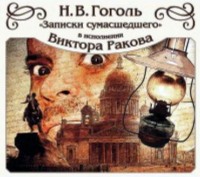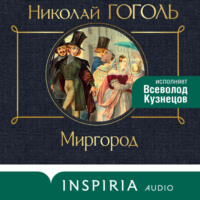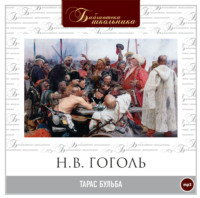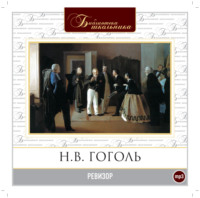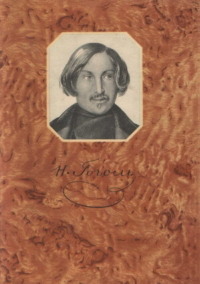 полная версия
полная версияTaras Bulba, and Other Tales
“Why don’t I need it? I might want to go shooting.”
“God be with you, Ivan Nikiforovitch! When will you go shooting? At the millennium, perhaps? So far as I know, or any one can recollect, you never killed even a duck; yes, and you are not built to go shooting. You have a dignified bearing and figure; how are you to drag yourself about the marshes, especially when your garment, which it is not polite to mention in conversation by name, is being aired at this very moment? No; you require rest, repose.” Ivan Ivanovitch as has been hinted at above, employed uncommonly picturesque language when it was necessary to persuade any one. How he talked! Heavens, how he could talk! “Yes, and you require polite actions. See here, give it to me!”
“The idea! The gun is valuable; you can’t find such guns anywhere nowadays. I bought it of a Turk when I joined the militia; and now, to give it away all of a sudden! Impossible! It is an indispensable article.”
“Indispensable for what?”
“For what? What if robbers should attack the house?… Indispensable indeed! Glory to God! I know that a gun stands in my storehouse.”
“A fine gun that! Why, Ivan Nikiforovitch, the lock is ruined.”
“What do you mean by ruined? It can be set right; all that needs to be done is to rub it with hemp-oil, so that it may not rust.”
“I see in your words, Ivan Nikiforovitch, anything but a friendly disposition towards me. You will do nothing for me in token of friendship.”
“How can you say, Ivan Ivanovitch, that I show you no friendship? You ought to be ashamed of yourself. Your oxen pasture on my steppes and I have never interfered with them. When you go to Poltava, you always ask for my waggon, and what then? Have I ever refused? Your children climb over the fence into my yard and play with my dogs—I never say anything; let them play, so long as they touch nothing; let them play!”
“If you won’t give it to me, then let us make some exchange.”
“What will you give me for it?” Thereupon Ivan Nikiforovitch raised himself on his elbow, and looked at Ivan Ivanovitch.
“I will give you my dark-brown sow, the one I have fed in the sty. A magnificent sow. You’ll see, she’ll bring you a litter of pigs next year.”
“I do not see, Ivan Ivanovitch, how you can talk so. What could I do with your sow? Make a funeral dinner for the devil?”
“Again! You can’t get along without the devil! It’s a sin! by Heaven, it’s a sin, Ivan Nikiforovitch!”
“What do you mean, Ivan Ivanovitch, by offering the deuce knows what kind of a sow for my gun?”
“Why is she ‘the deuce knows what,’ Ivan Nikiforovitch?”
“Why? You can judge for yourself perfectly well; here’s the gun, a known thing; but the deuce knows what that sow is like! If it had not been you who said it, Ivan Ivanovitch, I might have put an insulting construction on it.”
“What defect have you observed in the sow?”
“For what do you take me—for a sow?”
“Sit down, sit down! I won’t—No matter about your gun; let it rot and rust where it stands in the corner of the storeroom. I don’t want to say anything more about it!”
After this a pause ensued.
“They say,” began Ivan Ivanovitch, “that three kings have declared war against our Tzar.”
“Yes, Peter Feodorovitch told me so. What sort of war is this, and why is it?”
“I cannot say exactly, Ivan Nikiforovitch, what the cause is. I suppose the kings want us to adopt the Turkish faith.”
“Fools! They would have it,” said Ivan Nikiforovitch, raising his head.
“So, you see, our Tzar has declared war on them in consequence. ‘No,’ says he, ‘do you adopt the faith of Christ!’”
“Oh, our people will beat them, Ivan Ivanovitch!”
“They will. So you won’t exchange the gun, Ivan Nikiforovitch?”
“It’s a strange thing to me, Ivan Ivanovitch, that you, who seem to be a man distinguished for sense, should talk such nonsense. What a fool I should be!”
“Sit down, sit down. God be with it! let it burst! I won’t mention it again.”
At this moment lunch was brought in.
Ivan Ivanovitch drank a glass and ate a pie with sour cream. “Listen, Ivan Nikiforovitch: I will give you, besides the sow, two sacks of oats. You did not sow any oats. You’ll have to buy some this year in any case.”
“By Heaven, Ivan Ivanovitch, I must tell you you are very foolish! Who ever heard of swapping a gun for two sacks of oats? Never fear, you don’t offer your coat.”
“But you forget, Ivan Nikiforovitch, that I am to give you the sow too.”
“What! two sacks of oats and a sow for a gun?”
“Why, is it too little?”
“For a gun?”
“Of course, for a gun.”
“Two sacks for a gun?”
“Two sacks, not empty, but filled with oats; and you’ve forgotten the sow.”
“Kiss your sow; and if you don’t like that, then go to the Evil One!”
“Oh, get angry now, do! See here; they’ll stick your tongue full of red-hot needles in the other world for such godless words. After a conversation with you, one has to wash one’s face and hands and fumigate one’s self.”
“Excuse me, Ivan Ivanovitch; my gun is a choice thing, a most curious thing; and besides, it is a very agreeable decoration in a room.”
“You go on like a fool about that gun of yours, Ivan Nikiforovitch,” said Ivan Ivanovitch with vexation; for he was beginning to be really angry.
“And you, Ivan Ivanovitch, are a regular goose!”
If Ivan Nikiforovitch had not uttered that word they would not have quarrelled, but would have parted friends as usual; but now things took quite another turn. Ivan Ivanovitch flew into a rage.
“What was that you said, Ivan Nikiforovitch?” he said, raising his voice.
“I said you were like a goose, Ivan Ivanovitch!”
“How dare you, sir, forgetful of decency and the respect due to a man’s rank and family, insult him with such a disgraceful name!”
“What is there disgraceful about it? And why are you flourishing your hands so, Ivan Ivanovitch?”
“How dared you, I repeat, in disregard of all decency, call me a goose?”
“I spit on your head, Ivan Ivanovitch! What are you screeching about?”
Ivan Ivanovitch could no longer control himself. His lips quivered; his mouth lost its usual V shape, and became like the letter O; he glared so that he was terrible to look at. This very rarely happened with Ivan Ivanovitch: it was necessary that he should be extremely angry at first.
“Then, I declare to you,” exclaimed Ivan Ivanovitch, “that I will no longer know you!”
“A great pity! By Heaven, I shall never weep on that account!” retorted Ivan Nikiforovitch. He lied, by Heaven, he lied! for it was very annoying to him.
“I will never put my foot inside your house gain!”
“Oho, ho!” said Ivan Nikiforovitch, vexed, yet not knowing himself what to do, and rising to his feet, contrary to his custom. “Hey, there, woman, boy!” Thereupon there appeared at the door the same fat woman and the small boy, now enveloped in a long and wide coat. “Take Ivan Ivanovitch by the arms and lead him to the door!”
“What! a nobleman?” shouted Ivan Ivanovitch with a feeling of vexation and dignity. “Just do it if you dare! Come on! I’ll annihilate you and your stupid master. The crows won’t be able to find your bones.” Ivan Ivanovitch spoke with uncommon force when his spirit was up.
The group presented a striking picture: Ivan Nikiforovitch standing in the middle of the room; the woman with her mouth wide open and a senseless, terrified look on her face, and Ivan Ivanovitch with uplifted hand, as the Roman tribunes are depicted. This was a magnificent spectacle: and yet there was but one spectator; the boy in the ample coat, who stood quite quietly and picked his nose with his finger.
Finally Ivan Ivanovitch took his hat. “You have behaved well, Ivan Nikiforovitch, extremely well! I shall remember it.”
“Go, Ivan Ivanovitch, go! and see that you don’t come in my way: if you do, I’ll beat your ugly face to a jelly, Ivan Ivanovitch!”
“Take that, Ivan Nikiforovitch!” retorted Ivan Ivanovitch, making an insulting gesture and banged the door, which squeaked and flew open again behind him.
Ivan Nikiforovitch appeared at it and wanted to add something more; but Ivan Ivanovitch did not glance back and hastened from the yard.
CHAPTER III
WHAT TOOK PLACE AFTER IVAN IVANOVITCH’S QUARREL WITH IVAN NIKIFOROVITCH
And thus two respectable men, the pride and honour of Mirgorod, had quarrelled, and about what? About a bit of nonsense—a goose. They would not see each other, broke off all connection, though hitherto they had been known as the most inseparable friends. Every day Ivan Ivanovitch and Ivan Nikiforovitch had sent to inquire about each other’s health, and often conversed together from their balconies and said such charming things as did the heart good to listen to. On Sundays, Ivan Ivanovitch, in his lambskin pelisse, and Ivan Nikiforovitch, in his cinnamon-coloured nankeen spencer, used to set out for church almost arm in arm; and if Ivan Ivanovitch, who had remarkably sharp eyes, was the first to catch sight of a puddle or any dirt in the street, which sometimes happened in Mirgorod, he always said to Ivan Nikiforovitch, “Look out! don’t put your foot there, it’s dirty.” Ivan Nikiforovitch, on his side, exhibited the same touching tokens of friendship; and whenever he chanced to be standing, always held out his hand to Ivan Ivanovitch with his snuff-box, saying: “Do me the favour!” And what fine managers both were!—And these two friends!—When I heard of it, it struck me like a flash of lightning. For a long time I would not believe it. Ivan Ivanovitch quarrelling with Ivan Nikiforovitch! Such worthy people! What is to be depended upon, then, in this world?
When Ivan Ivanovitch reached home, he remained for some time in a state of strong excitement. He usually went, first of all, to the stable to see whether his mare was eating her hay; for he had a bay mare with a white star on her forehead, and a very pretty little mare she was too; then to feed the turkeys and the little pigs with his own hand, and then to his room, where he either made wooden dishes, for he could make various vessels of wood very tastefully, quite as well as any turner, or read a book printed by Liubia, Garia, and Popoff (Ivan Ivanovitch could never remember the name, because the serving-maid had long before torn off the top part of the title-page while amusing the children), or rested on the balcony. But now he did not betake himself to any of his ordinary occupations. Instead, on encountering Gapka, he at once began to scold her for loitering about without any occupation, though she was carrying groats to the kitchen; flung a stick at a cock which came upon the balcony for his customary treat; and when the dirty little boy, in his little torn blouse, ran up to him and shouted: “Papa, papa! give me a honey-cake,” he threatened him and stamped at him so fiercely that the frightened child fled, God knows whither.
But at last he bethought himself, and began to busy himself about his every-day duties. He dined late, and it was almost night when he lay down to rest on the balcony. A good beet-soup with pigeons, which Gapka had cooked for him, quite drove from his mind the occurrences of the morning. Again Ivan Ivanovitch began to gaze at his belongings with satisfaction. At length his eye rested on the neighbouring yard; and he said to himself, “I have not been to Ivan Nikiforovitch’s to-day: I’ll go there now.” So saying, Ivan Ivanovitch took his stick and his hat, and directed his steps to the street; but scarcely had he passed through the gate than he recollected the quarrel, spit, and turned back. Almost the same thing happened at Ivan Nikiforovitch’s house. Ivan Ivanovitch saw the woman put her foot on the fence, with the intention of climbing over into his yard, when suddenly Ivan Nikiforovitch’s voice was heard crying: “Come back! it won’t do!” But Ivan Ivanovitch found it very tiresome. It is quite possible that these worthy men would have made their peace next day if a certain occurrence in Ivan Nikiforovitch’s house had not destroyed all hopes and poured oil upon the fire of enmity which was ready to die out.
On the evening of that very day, Agafya Fedosyevna arrived at Ivan Nikiforovitch’s. Agafya Fedosyevna was not Ivan Nikiforovitch’s relative, nor his sister-in-law, nor even his fellow-godparent. There seemed to be no reason why she should come to him, and he was not particularly glad of her company; still, she came, and lived on him for weeks at a time, and even longer. Then she took possession of the keys and took the management of the whole house into her own hands. This was extremely displeasing to Ivan Nikiforovitch; but he, to his amazement, obeyed her like a child; and although he occasionally attempted to dispute, yet Agafya Fedosyevna always got the better of him.
I must confess that I do not understand why things are so arranged, that women should seize us by the nose as deftly as they do the handle of a teapot. Either their hands are so constructed or else our noses are good for nothing else. And notwithstanding the fact that Ivan Nikiforovitch’s nose somewhat resembled a plum, she grasped that nose and led him about after her like a dog. He even, in her presence, involuntarily altered his ordinary manner of life.
Agafya Fedosyevna wore a cap on her head, and a coffee-coloured cloak with yellow flowers and had three warts on her nose. Her figure was like a cask, and it would have been as hard to tell where to look for her waist as for her to see her nose without a mirror. Her feet were small and shaped like two cushions. She talked scandal, ate boiled beet-soup in the morning, and swore extremely; and amidst all these various occupations her countenance never for one instant changed its expression, which phenomenon, as a rule, women alone are capable of displaying.
As soon as she arrived, everything went wrong.
“Ivan Nikiforovitch, don’t you make peace with him, nor ask his forgiveness; he wants to ruin you; that’s the kind of man he is! you don’t know him yet!” That cursed woman whispered and whispered, and managed so that Ivan Nikiforovitch would not even hear Ivan Ivanovitch mentioned.
Everything assumed another aspect. If his neighbour’s dog ran into the yard, it was beaten within an inch of its life; the children, who climbed over the fence, were sent back with howls, their little shirts stripped up, and marks of a switch behind. Even the old woman, when Ivan Ivanovitch ventured to ask her about something, did something so insulting that Ivan Ivanovitch, being an extremely delicate man, only spit, and muttered, “What a nasty woman! even worse than her master!”
Finally, as a climax to all the insults, his hated neighbour built a goose-shed right against his fence at the spot where they usually climbed over, as if with the express intention of redoubling the insult. This shed, so hateful to Ivan Ivanovitch, was constructed with diabolical swiftness—in one day.
This aroused wrath and a desire for revenge in Ivan Ivanovitch. He showed no signs of bitterness, in spite of the fact that the shed encroached on his land; but his heart beat so violently that it was extremely difficult for him to preserve his calm appearance.
He passed the day in this manner. Night came—Oh, if I were a painter, how magnificently I would depict the night’s charms! I would describe how all Mirgorod sleeps; how steadily the myriads of stars gaze down upon it; how the apparent quiet is filled far and near with the barking of dogs; how the love-sick sacristan steals past them, and scales the fence with knightly fearlessness; how the white walls of the houses, bathed in the moonlight, grow whiter still, the overhanging trees darker; how the shadows of the trees fall blacker, the flowers and the silent grass become more fragrant, and the crickets, unharmonious cavaliers of the night, strike up their rattling song in friendly fashion on all sides. I would describe how, in one of the little, low-roofed, clay houses, the black-browed village maid, tossing on her lonely couch, dreams with heaving bosom of some hussar’s spurs and moustache, and how the moonlight smiles upon her cheeks. I would describe how the black shadows of the bats flit along the white road before they alight upon the white chimneys of the cottages.
But it would hardly be within my power to depict Ivan Ivanovitch as he crept out that night, saw in hand; or the various emotions written on his countenance! Quietly, most quietly, he crawled along and climbed upon the goose-shed. Ivan Nikiforovitch’s dogs knew nothing, as yet, of the quarrel between them; and so they permitted him, as an old friend, to enter the shed, which rested upon four oaken posts. Creeping up to the nearest post he applied his saw and began to cut. The noise produced by the saw caused him to glance about him every moment, but the recollection of the insult restored his courage. The first post was sawed through. Ivan Ivanovitch began upon the next. His eyes burned and he saw nothing for terror.
All at once he uttered an exclamation and became petrified with fear. A ghost appeared to him; but he speedily recovered himself on perceiving that it was a goose, thrusting its neck out at him. Ivan Ivanovitch spit with vexation and proceeded with his work. The second post was sawed through; the building trembled. His heart beat so violently when he began on the third, that he had to stop several times. The post was more than half sawed through when the frail building quivered violently.
Ivan Ivanovitch had barely time to spring back when it came down with a crash. Seizing his saw, he ran home in the greatest terror and flung himself upon his bed, without having sufficient courage to peep from the window at the consequences of his terrible deed. It seemed to him as though Ivan Nikiforovitch’s entire household—the old woman, Ivan Nikiforovitch, the boy in the endless coat, all with sticks, and led by Agafya Fedosyevna—were coming to tear down and destroy his house.
Ivan Ivanovitch passed the whole of the following day in a perfect fever. It seemed to him that his detested neighbour would set fire to his house at least in revenge for this; and so he gave orders to Gapka to keep a constant lookout, everywhere, and see whether dry straw were laid against it anywhere. Finally, in order to forestall Ivan Nikiforovitch, he determined to enter a complaint against him before the district judge of Mirgorod. In what it consisted can be learned from the following chapter.
CHAPTER IV
WHAT TOOK PLACE BEFORE THE DISTRICT JUDGE OF MIRGOROD
A wonderful town is Mirgorod! How many buildings are there with straw, rush, and even wooden roofs! On the right is a street, on the left a street, and fine fences everywhere. Over them twine hop-vines, upon them hang pots; from behind them the sunflowers show their sun-like heads, poppies blush, fat pumpkins peep; all is luxury itself! The fence is invariably garnished with articles which render it still more picturesque: woman’s widespread undergarments of checked woollen stuff, shirts, or trousers. There is no such thing as theft or rascality in Mirgorod, so everybody hangs upon his fence whatever strikes his fancy. If you go on to the square, you will surely stop and admire the view: such a wonderful pool is there! The finest you ever saw. It occupies nearly the whole of the square. A truly magnificent pool! The houses and cottages, which at a distance might be mistaken for hayricks, stand around it, lost in admiration of its beauty.
But I agree with those who think that there is no better house than that of the district judge. Whether it is of oak or birch is nothing to the point; but it has, my dear sirs, eight windows! eight windows in a row, looking directly on the square and upon that watery expanse which I have just mentioned, and which the chief of police calls a lake. It alone is painted the colour of granite. All the other houses in Mirgorod are merely whitewashed. Its roof is of wood, and would have been even painted red, had not the government clerks eaten the oil which had been prepared for that purpose, as it happened during a fast; and so the roof remained unpainted. Towards the square projects a porch, which the chickens frequently visit, because that porch is nearly always strewn with grain or something edible, not intentionally, but through the carelessness of visitors.
The house is divided into two parts: one of which is the court-room; the other the jail. In the half which contains the court-room are two neat, whitewashed rooms, the front one for clients, the other having a table adorned with ink-spots, and with a looking-glass upon it, and four oak chairs with tall backs; whilst along the wall stand iron-bound chests, in which are preserved bundles of papers relating to district law-suits. Upon one of the chests stood at that time a pair of boots, polished with wax.
The court had been open since morning. The judge, a rather stout man, though thinner than Ivan Nikiforovitch, with a good-natured face, a greasy dressing-gown, a pipe, and a cup of tea, was conversing with the clerk of the court.
The judge’s lips were directly under his nose, so that he could snuff his upper lip as much as he liked. It served him instead of a snuff-box, for the snuff intended for his nose almost always lodged upon it. So the judge was talking with the assistant. A barefooted girl stood holding a tray with cups at once side of them. At the end of the table, the secretary was reading the decision in some case, but in such a mournful and monotonous voice that the condemned man himself would have fallen asleep while listening to it. The judge, no doubt, would have been the first to do so had he not entered into an engrossing conversation while it was going on.
“I expressly tried to find out,” said the judge, sipping his already cold tea from the cup, “how they manage to sing so well. I had a splendid thrush two years ago. Well, all of a sudden he was completely done for, and began to sing, God knows what! He got worse and worse and worse and worse as time went on; he began to rattle and get hoarse—just good for nothing! And this is how it happened: a little lump, not so big as a pea, had come under his throat. It was only necessary to prick that little swelling with a needle—Zachar Prokofievitch taught me that; and, if you like, I’ll just tell you how it was. I went to him—”
“Shall I read another, Demyan Demyanovitch?” broke in the secretary, who had not been reading for several minutes.
“Have you finished already? Only think how quickly! And I did not hear a word of it! Where is it? Give it me and I’ll sign it. What else have you there?”
“The case of Cossack Bokitok for stealing a cow.”
“Very good; read it!—Yes, so I went to him—I can even tell you in detail how he entertained me. There was vodka, and dried sturgeon, excellent! Yes, not our sturgeon,” there the judge smacked his tongue and smiled, upon which his nose took a sniff at its usual snuff-box, “such as our Mirgorod shops sell us. I ate no herrings, for, as you know, they give me heart-burn; but I tasted the caviare—very fine caviare, too! There’s no doubt it, excellent! Then I drank some peach-brandy, real gentian. There was saffron-brandy also; but, as you know, I never take that. You see, it was all very good. In the first place, to whet your appetite, as they say, and then to satisfy it—Ah! speak of an angel,” exclaimed the judge, all at once, catching sight of Ivan Ivanovitch as he entered.
“God be with us! I wish you a good-morning,” said Ivan Ivanovitch, bowing all round with his usual politeness. How well he understood the art of fascinating everybody in his manner! I never beheld such refinement. He knew his own worth quite well, and therefore looked for universal respect as his due. The judge himself handed Ivan Ivanovitch a chair; and his nose inhaled all the snuff resting on his upper lip, which, with him, was always a sign of great pleasure.
“What will you take, Ivan Ivanovitch?” he inquired: “will you have a cup of tea?”
“No, much obliged,” replied Ivan Ivanovitch, as he bowed and seated himself.
“Do me the favour—one little cup,” repeated the judge.
“No, thank you; much obliged for your hospitality,” replied Ivan Ivanovitch, and rose, bowed, and sat down again.
“Just one little cup,” repeated the judge.
“No, do not trouble yourself, Demyan Demyanovitch.” Whereupon Ivan Ivanovitch again rose, bowed, and sat down.
“A little cup!”


